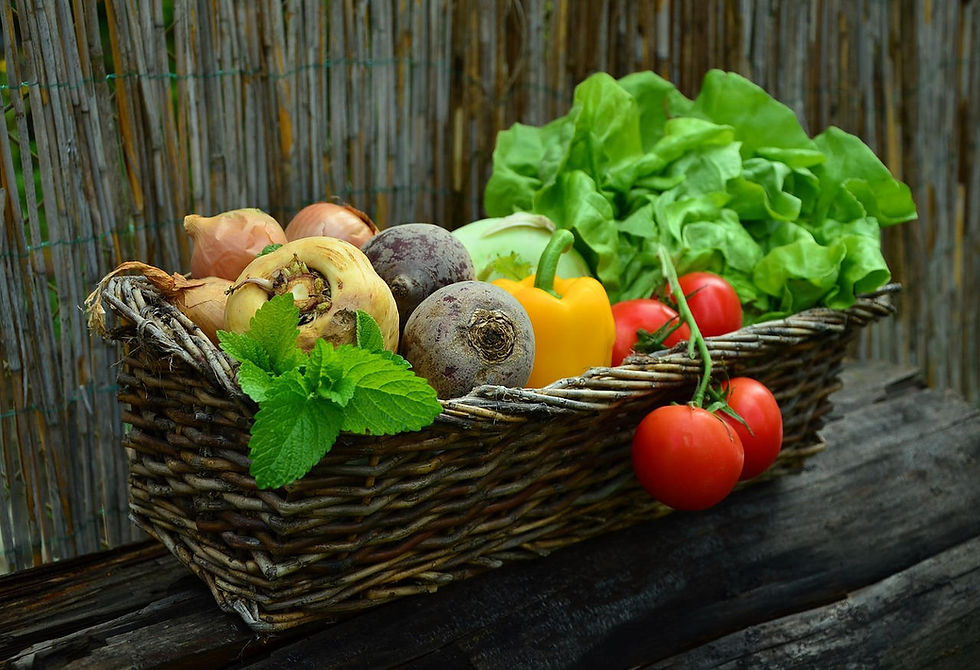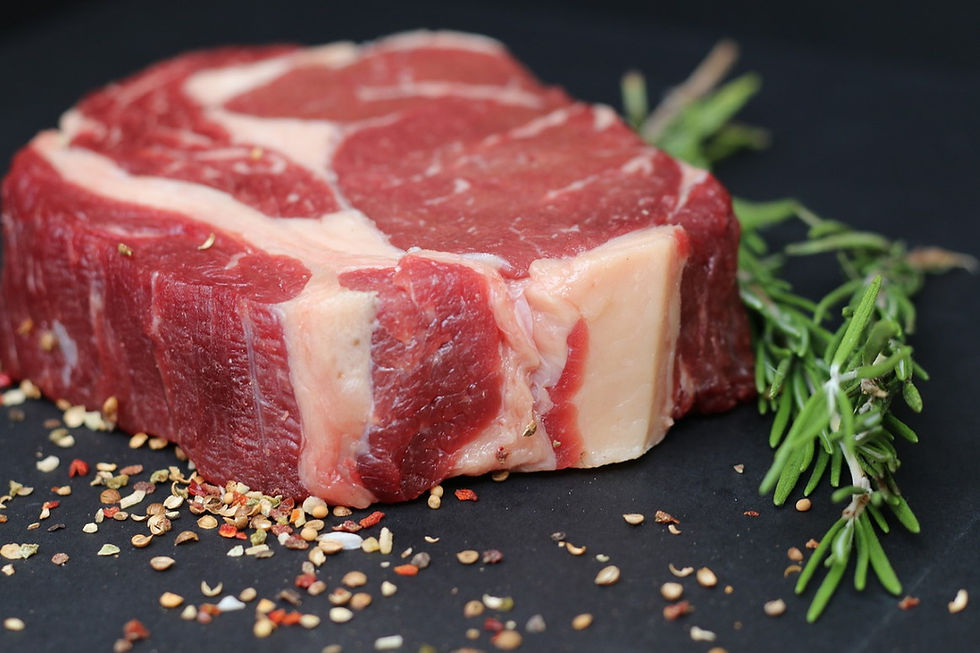Animal Protein vs Plant Protein
- Chris Browning

- Sep 10, 2019
- 6 min read
Updated: Nov 24, 2019

Note: This is not a post arguing for (or against) a plant or meat-based diet... This is a very brief overview of some basic considerations that you should be thinking about IF you are considering a change to your diet. Before making any significant changes to your diet... arrange a consultation with a registered dietitian.
Vegan diets are becoming increasingly popular...
Possible benefits for the environment, and for health, plus a surge in celebrities endorsing this lifestyle, have led to many people making the switch from meat heavy diets.
But what is the truth? Is a plant-based diet actually beneficial to you? What are the possible downsides?
As with most health & fitness questions, the answers are not black and white...
Pros & Cons
Would you be healthier if you gave up meat?
The short answer is... probably not...
This reflects the mistake that many people make... Animal products are not unhealthy per se.
Imagine that you eat meat, but have a generally poor diet... Low protein, low fibre, vitamin & mineral deficiencies, high sugar etc...
If this was the case, simply removing meat, without making any other changes, is not going to help. You still have a very unhealthy diet. In fact it's probably worse as your protein intake has now dropped. You would be failing to eat the nutrients that your body needs and your health could suffer.
So from a simple 'elimination' point of view, cutting out meat is not automatically beneficial.
If, however, you knew how to achieve your nutritional needs via alternative foods, you could manage without meat.
Basically, this means identifying which alternative foods you can eat to provide the nutrients that you would be otherwise missing out on. And because of the nature of plant based foods, this would probably carry additional benefits ie. extra fibre and a greater amount, and variety, of vitamins and minerals.
This might sound simple. But it's far from easy in reality. It is important to consult with a dietician at this point to make sure you know how, and why, to make the necessary changes to your diet.
(Instagrammers & bloggers are not experts. If you are thinking of making significant changes to your diet, or you're worried about the current quality of your nutrition - speak to a QUALIFIED professional!)
For example, removing meat from your diet means that you are taking away your greatest source of quality proteins. (In terms of both quantity and quality). Adding in a few beans here and there will not replace the QUANTITY OR QUALITY of that protein.
You must understand your dietary requirements before making drastic changes. Especially if you are thinking of cutting food groups out. Which important nutrients are you going to be sacrificing? How to do replace these? Can you simply eat different foods or do you need supplements?
It is extremely difficult to answer these questions yourself. Hence the fact that general advice is to eat a "balanced, wholefood diet, including plenty of fruit & veg" as it will cover all bases, including all of the essential nutrients that you need for good health.
Meat Quality

A common point made my vegan diet advocates...there are legitimate concerns regarding meat quality.
Poor animal welfare, high levels of food processing, questionable hygiene practices, medicines/steroids etc, can all affect the produce that ends up on our plates... Then there's the ethical arguement regarding those concerns.
You can mitigate a lot of these concerns by selecting the highest quality foods that your budget allows. From a nutrition point of view, there are clear benefits to buying organic and/or free-range produce...
For example, free-range chickens produce meat that is higher in protein, compared to caged hens. And their eggs are higher in Vitamins A & E and the heart-healthy fat Omega-3.

Complete vs Incomplete Proteins
Protein is made up of smaller nutrients called amino acids.
There are a 20 amino acids, and the countless different combinations determine the type and function of each protein.
Your body can manufacture 12 of these amino acids.
The remaining 8 cannot be created from within the body so the only way of obtaining these, is to eat them. They are therefore known as "Essential Amino Acids" (EAA's).
Failing to eat enough of these EAA's means that you will not be able to manufacture enough of the proteins that rely on those amino acids (3 of these are vital in the repair/building process that takes place in muscles post-exercise).
In other words, your health and wellbeing depends on having enough of those amino acids. So failing to eat enough foods that contain them, can cause health problems and hold back your fitness progress.
Meat, dairy, and eggs contain all 8 Essential Amino Acids. Providing that your total protein intake for each day is on target, you will automatically be getting enough of each amino acid by eating animal products.
Most plant based sources of protein DO NOT contain all 8 EAA's. Vegans/vegetarians will need to eat a variety of plant-based foods to achieve the same daily nutrient intake. For example, some plants are high in most EAAs, but low in Tryptophan. You would need to combine those foods with something that has a high Tryptophan content to replicate the complete proteins found in animal produce.
Again, the reality is, most vegans are completely unaware of these details and how to remedy them. (Don't forget, the best way to make sure you are following a healthy vegan diet is to consult a dietician).
It would be wrong to say that you can't obtain adequate, quality protein from a plant based diet. But you do need to be more organised - more effort and a a greater understanding of nutrition is required.
Vitamin Deficiencies
Everybody (hopefully) knows that eating a wide range of fruit and vegetables is essential for supplying important vitamins & minerals... And that these are essential for good health & fitness.
What you may not be aware of, is that animal products are often the best source of some of these vital nutrients.
For example...
B Vitamins (vital for the effective digestion & absorption of other nutrients) are abundant in meats and harder to find in plants. (Vitamin B12 in particular is noted as a very common deficiency in vegans).
Iron (vital for healthy blood) is notably obtained from red meat. While plants such as spinach also contain a form of iron, it less easily absorbed by the body. (Iron deficiancy can lead to anaemia). Calcium (healthy bones/teeth, proper muscle function) is commonly found in dairy foods.
So before removing any food from your diet, take the following 2 vital steps;
1) Identify the nutrients that you are currently gaining from that food
2) Identify the foods that you will need to eat in order to replace those nutrients once they are missing
Failure to do so may leave you short of essential vitamins and minerals.
The Ethical Viewpoint

Any adult can, and should, make decisions based on their own morals and beliefs.
You could argue that nature intends for us to be part of a food chain. Just like carnivores that exist in the jungle or the sea. As you know, eating animal products DOES provide us with nutrients which support our own wellbeing. Perhaps this is just how it's meant to be?
But a lot of people will argue against any food that comes from animals, based on the moral view that animals should not be exploited for human gain. You could say that as we are so advanced and capable of making more complex decisions than animals, we should choose not to eat animal produce, even if it challenges our convenience, or maybe even our health. After all, we know how to obtain almost everything we need from plants or supplements.
Would you choose to make personal sacrifices (or perhaps risk influencing family and friends) that could affect your health, for the "greater good"...
Or should you prioritise your own wellbeing?
Obviously this is an individual choice. But as a P.T, it's important to point out the flaws in anybodys current lifestyle and suggest changes that address those flaws. In some cases, vegan/vegetarian diets can create significant problems for individuals.
The Point
Veganism is currently all over the news and all over social media. Celebrities with thousands of followers (and often a personal chef btw) are promoting veganism to appear environmentally conscious, to sell supplements or perhaps in a genuine attempt to promote their own opinion/belief of what is 'right'.
It's tempting, after being exposed to these ideas for a certain amount of time, to feel that you should be adopting these changes in your own life.
The point here, is do your research first. And do it very thoroughly. This post DOES NOT contain all of the information required to make an informed choice. (Neither does any single blog, single Youtube video or single Netflix documentary). This is simply a brief overview of some of the factors involved.
If, after a period of reflection, you decide that your health (or conscience) would benefit from removing/reducing meat in your diet, seek the advice of a dietician and go from there. Make sure you are fully aware of the effect this could have on your nutritional intake, and your health.






Comments